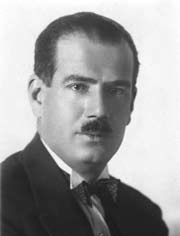Ruşen Eşref Ünaydın
- View a machine-translated version of the Turkish article.
- Machine translation, like DeepL or Google Translate, is a useful starting point for translations, but translators must revise errors as necessary and confirm that the translation is accurate, rather than simply copy-pasting machine-translated text into the English Wikipedia.
- Consider adding a topic to this template: there are already 492 articles in the main category, and specifying
|topic=will aid in categorization. - Do not translate text that appears unreliable or low-quality. If possible, verify the text with references provided in the foreign-language article.
- You must provide copyright attribution in the edit summary accompanying your translation by providing an interlanguage link to the source of your translation. A model attribution edit summary is
Content in this edit is translated from the existing Turkish Wikipedia article at [[:tr:Ruşen Eşref Ünaydın]]; see its history for attribution. - You may also add the template
{{Translated|tr|Ruşen Eşref Ünaydın}}to the talk page. - For more guidance, see Wikipedia:Translation.
Ruşen Eşref Ünaydın | |
|---|---|
 | |
| Personal details | |
| Born | (1892-03-18)18 March 1892 Istanbul, Ottoman Empire |
| Died | 21 September 1959(1959-09-21) (aged 67)[1] Istanbul , Turkey |
| Nationality | Turkish |
| Political party | Republican People's Party (CHP) |
| Education | Galatasaray High School |
| Alma mater | Istanbul University, Faculty of Literature |
| Occupation | Politician, diplomat and journalist |
Ruşen Eşref Ünaydın (1892–1959) was a Turkish linguist, politician, journalist, diplomat, writer and author. He was one of the contributors of Süs, a women's magazine between 1923 and 1924.[2] He was a member of the commission involved in introducing the modern Turkish alphabet.[3] He was one of the founders of the Turkish Language Association and its first Secretary General (1933).[4][5] He was appointed ambassador to Albania (1934),[6] Hungary (1939–1943),[7] Italy (1943–1944), the United Kingdom (1944–1945),[8] and Greece (1945–1952).[9]
Ünaydın was a pioneer in Turkish literature and journalism for the interviews he published in 1917 and 1918. These were hailed as the first modern features appeared in Turkish newspapers, and were later published as a book entitled "Diyorlar Ki" (Thus They Said).[10]
References
- ^ "Ruşen Eşref Ünaydın". Dil Dernegi.
- ^ Özgün Uçar (October 2023). "Cumhuriyetin öncü kadın dergisi". Tarih (in Turkish). Retrieved 3 January 2024.
- ^ "Harf Devrimi". dildernegi.org.tr. Dil Derneği. Retrieved 1 November 2019.
- ^ Türk dili (in Turkish). Türk Dili Tetkik Cemiyeti. 1933. p. 6.
Umumî Katip: Ruşen Eşref Bey
- ^ Tan, Nail (July 2019). "Turkish Language Association from 1932 to 2012" (PDF). TURKISH LANGUAGE - Journal of Language and Literature (in Turkish). CXVII (811). Turkish Language Association: 41.
Ruşen Eşref (Ünaydın): 1932-1933
- ^ "Embassy History and Previous Ambassadors". Turkish Embassy in Tirana.
- ^ "Embassy History and Previous Ambassadors". Turkish Embassy in Budapest.
- ^ "Embassy History and Previous Ambassadors". Turkish Embassy in London.
- ^ "Büyükelçilik Tarihi ve Önceki Büyükelçilerimiz". Turkish Embassy in Athens.
- ^ "Ruşen Eşref". YKS Türkçe Edebiyat.

- v
- t
- e
  | This Turkish diplomat-related article is a stub. You can help Wikipedia by expanding it. |
- v
- t
- e









